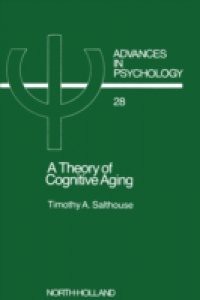Over a half-century of research has documented the fact that people of different ages perform at different levels on a variety of tests of cognitive functioning, and yet there are still no comprehensive theories to account for these phenomena. A Theory of Cognitive Aging is intended to begin intellectual discussion in this area by identifying major issues of controversy, and proposing a particular theoretical interpretation based on the notion that the rate of processing information slows down with increased age. Although still quite preliminary, the theoretical perspective is demonstrated to provide a plausible account for age-related differences in functioning on measures of memory, spatial ability and reasoning. The book has four aims: - To advocate a more explicitly theoretical approach to research in the area of cognitive aging. - To outline three important dimensions along which it is argued that any theory of cognitive aging phenomena must take a position. - To evaluate empirical evidence relevant to specific positions along those dimensions. - To summarize the major concepts of the current theory, and to describe its application to selected findings in the research literature.

